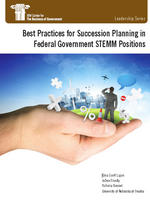
Best Practices for Succession Planning in Federal Government STEMM Positions

In fact, the President’s Council of Advisors on Science and Technology estimates that, given present trends, there will be one million fewer STEMM graduates over the next decade than the nation is expected to need.
The federal government has developed a strategy to close this gap for the nation as a whole, but has yet to develop a plan to close the gap for itself. The federal government today is a major employer of STEMM graduates and will need more in the years ahead. For example, more than two-thirds of NASA employees are scientists and engineers, and NASA has one of the oldest workforces in the federal government, so many NASA employees are nearing retirement.
This report outlines six steps for federal agencies dependent on STEMM employees to take now. The report also discusses how agencies’ STEMM leaders and human capital staffs can work together to ensure that their agencies have the right mix of expertise to meet mission requirements today and in the future. These steps include:
- Formulating a strategy for succession planning
- Identifying, selecting, developing, and tracking leadership candidates
- Placing candidates into leadership positions
- Evaluating results



